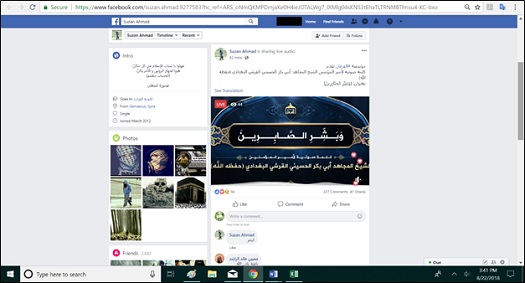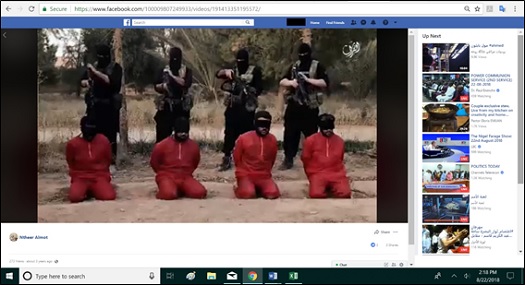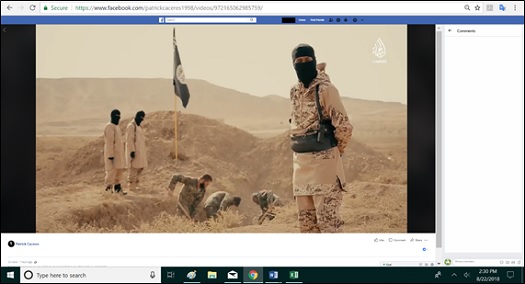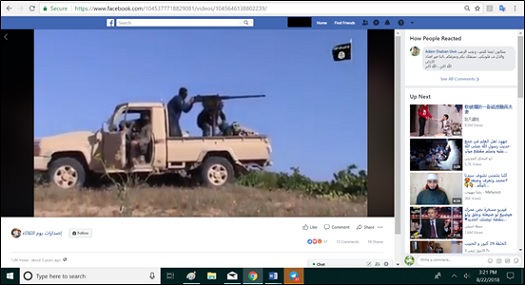Action Comes as Facebook Found to Instigate Ethnic Violence in Germany & Myanmar
European Union (EU) officials formally announced a crackdown on tech companies this week deciding to abandon its voluntary policies in favor of stronger regulation. Speaking to the Financial Times regarding the removal of extremist content online, Commissioner for the Security Union Julian King stated that not enough progress had been made by the likes of Facebook, Twitter and YouTube, and that further action would be taken “in order to better protect our citizens.” The new rules are expected to reflect previous proposals that required platforms to remove extremist content within an hour of its upload and will be applied to all companies, regardless of size.
Two separate reports about Facebook this week – one in Germany and another in Myanmar – demonstrate the necessities for stronger enforcement and the failure of self-regulation. University of Warwick researchers analyzed 3,335 instances of anti-refugee attacks in the country and found that areas with heightened Facebook usage “reliably experienced more attacks on refugees … suggesting that the link applies universally.” The study also found that if Facebook could be “linked to hundreds of attacks even in Germany, its effect could be far more severe in countries … with weaker institutions, weaker social media regulations and more immediate histories of political violence” as evidenced by a Reuters and U.C. Berkeley investigation that found over a thousand Facebook posts in Myanmar meant to incite ethnic violence.
To meet the EU’s one-hour limit, Facebook has its work cut out for them. Researchers in the Myanmar report found that in some cases, posts, comments, images and videos inciting violence have been up “for as long as six years.” The Counter Extremism Project’s own research have found similar results. It found one ISIS video, “Harvest of Spies 3,” that has been up for nearly three years and shows interviews with four accused spies before they are executed with rifles. Another ISIS video, “Harvest of the Solders,” has also been up for three years. The clip shows a lecture from an ISIS commander, vehicular suicide bombers, combat against Egyptian security forces and a missile attack on an Egyptian naval vessel.
To read more about this issue and see the aforementioned examples, as well as other examples of extremist content, please see the background below.
EXTREMIST FACEBOOK CONTENT
1. Facebook Live Broadcast Of Baghdadi Speech
- Located on Facebook: August 22, 2018
- Time on Facebook: 42 minutes
- Views: N/A, 94 likes/reacts and 41 “shares”
- URL: Link
- Description: A Facebook Live broadcast of a speech by ISIS’s leader Abu Bakr al-Baghdadi. The speech was originally released the same day it was posted, on August 22, 2018. A live broadcast allows the individual who posted the content to livestream it to an audience and get immediate feedback. After broadcasting for only 41 minutes, this broadcast received over 225 comments. In the speech, Baghdadi called for perseverance and for the continuation of the fight.

2. ISIS Execution Video On Facebook For Almost Three Years
- Located on Facebook: August 22, 2018
- Time on Facebook: Nearly three years
- Views: 272, three likes/reacts and three shares
- URL: Link
- Description: The ISIS video “Harvest of Spies 3,” originally released on October 29, 2015 from the group’s self-proclaimed Furat province the Iraq-Syria border area. The video shows interviews with four accused spies before they are executed with rifles.

3. Notorious ISIS Video “The Flames Of War II”
- Located on Facebook: August 22, 2018
- Time on Facebook: Seven hours
- Views: 33 and one like/react
- URL: Link
- Description: ISIS video “The Flames of War II: Until the Final Hour,” released on November 29, 2017, via the group’s Al Hayat Media Center. The video serves as a motivational video for the terror group by encouraging ISIS fighters and attempting to inspire overseas attacks. In addition to numerous quotes from Abul-Hasan al-Muhajir, Abu Mohammad al-Adnani, and Abu Bakr al-Baghdadi, the video features numerous beheadings, shootings and an immolation.

4. ISIS Clip On Facebook For Almost Three Years With Over 1,400 Views
- Located on Facebook: August 22, 2018
- Time on Facebook: Approximately three years
- Views: 1,400+, 17 likes/reacts and 18 shares
- URL: Link
- Description: A section from the ISIS video “Harvest of the Soldiers” from the group’s self-proclaimed province in Sinai. The video was originally released on September 1, 2015. The clip on Facebook shows a lecture from an ISIS commander, vehicular suicide bombers, combat against Egyptian security forces and a missile attack on an Egyptian naval vessel.

BACKGROUND
EU Plans On Enacting Stricter Regulation On Tech Companies Meant To Better Take Down Extremist Content That Incites Violence. “Brussels plans to force companies including Facebook, YouTube and Twitter to identify and delete online terrorist propaganda and extremist violence or face the threat of fines. The European Commission has decided to abandon a voluntary approach to get big internet platforms to remove terror-related videos, posts and audio clips from their websites, in favour of tougher draft regulation due to be published next month … The proposed regulation would be the first time that the EU has explicitly targeted tech companies’ handling of illegal content. So far, Brussels has favoured self-regulation for tech platforms who are not considered legally responsible for material on their websites. In March, the commission toughened up its voluntary guidelines, encouraging the removal of material that incites terrorist violence or can radicalise users within one hour. Brussels promised to review progress made within three months and reserved the right to come up with legislation.” (Mehreen Khan, “Brussels To Act Against Tech Groups Over Terror Content,” Financial Times, 8/19/18)
EU Commissioner For Security Julian King: Organization Needs To “Take Stronger Action In Order To Better Protect Our Citizens.” “Julian King, the EU’s commissioner for security, told the Financial Times that Brussels had ‘not seen enough progress’ on the removal of terrorist material from technology companies and would ‘take stronger action in order to better protect our citizens.’ ‘We cannot afford to relax or become complacent in the face of such a shadowy and destructive phenomenon,’ said Mr King.” (Mehreen Khan, “Brussels To Act Against Tech Groups Over Terror Content,” Financial Times, 8/19/18)
A University Of Warwick Study Found Facebook To Be A Primary Link To Increased Violence Against Refugees In Germany. “When you ask locals why Dirk Denkhaus, a young firefighter trainee who had been considered neither dangerous nor political, broke into the attic of a refugee group house and tried to set it on fire, they will list the familiar issues. This small riverside town is shrinking and its economy declining, they say, leaving young people bored and disillusioned. Though most here supported the mayor’s decision to accept an extra allotment of refugees, some found the influx disorienting. Fringe politics are on the rise. But they’ll often mention another factor not typically associated with Germany’s spate of anti-refugee violence: Facebook … This may be more than speculation. Little Altena exemplifies a phenomenon long suspected by researchers who study Facebook: that the platform makes communities more prone to racial violence. And, now, the town is one of 3,000-plus data points in a landmark study that claims to prove it. Karsten Müller and Carlo Schwarz, researchers at the University of Warwick, scrutinized every anti-refugee attack in Germany, 3,335 in all, over a two-year span.” (Amanda Taub & Max Fisher, “Facebook Fueled Anti-Refugee Attacks In Germany, New Research Suggests,” The New York Times, 8/21/18)
A Reuters & U.C. Berkeley Investigation Found Over A Thousand Examples Of Extremist Content In Myanmar Meant To Incite Ethnic Violence. “In April, Facebook founder Mark Zuckerberg told U.S. senators that the social media site was hiring dozens more Burmese speakers to review hate speech posted in Myanmar. The situation was dire … Four months after Zuckerberg’s pledge to act, here is a sampling of posts from Myanmar that were viewable this month on Facebook … The remarks are among more than 1,000 examples Reuters found of posts, comments, images and videos attacking the Rohingya or other Myanmar Muslims that were on Facebook as of last week. Almost all are in the main local language, Burmese. The anti-Rohingya and anti-Muslim invective analyzed for this article – which was collected by Reuters and the Human Rights Center at UC Berkeley School of Law – includes material that’s been up on Facebook for as long as six years.” (Steve Stecklow, “Why Facebook Is Losing The War On Hate Speech In Myanmar,” Reuters, 8/15/18)
